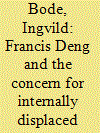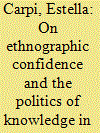| Srl | Item |
| 1 |
ID:
130706


|
|
|
|
|
| Publication |
2014.
|
| Summary/Abstract |
Using the case of Francis Deng as representative of the Secretary-General for internally displaced persons as an example, this article considers how temporary civil servants may become intellectual leaders within the United Nations. During his 1992-2004 tenure, Deng managed to raise assistance and protection expectations for the internally displaced through framing their concerns in the concept of sovereignty as responsibility. He also contributed to legal change through formulating protection and assistance standards-the Guiding Principles on Internal Displacement. The article argues that a combination of three factors enabled him to exercise intellectual leadership. First, his insider-outsider position at the border between the UN Secretariat (the second UN) and the nongovernmental organizations, academic scholars, and independent experts who engage regularly with the UN (the third UN); second, his personal qualities; and third, his effective ways of framing at an opportune moment in time.
|
|
|
|
|
|
|
|
|
|
|
|
|
|
|
|
| 2 |
ID:
175146


|
|
|
|
|
| Summary/Abstract |
Fieldworkers in politically sensitive spaces traditionally need to negotiate their presence in the field with local (in)formal authorities and epistemic power-holders. I illustrate how attempts at both holistic politicisation and neutralisation of the research space can question ethnographic knowledge production. Drawing upon the anthropology of silence and agnotology, I interrogate the whats and hows of ethnographic authority and local validation of ethnographic research when political and epistemic powers complexly and discontinuously overlap. By examining how knowledge is boasted about, concealed or questioned by political and humanitarian actors, I examine the ways in which a lack of political protection, as well as overt advocacy, shape different modalities of access – or lack of access – to the field. Against the backdrop of a growing body of literature on the ethics of research in settings affected by political transformations and emergency crises (such as today’s Arab Levant), I try to upend ethnographic confidence as a self-centred process of knowledge production. I instead rethink it not only as an ethical but also an inter-subjective effort towards a more effective integration of the counter-epistemologies of field interlocutors into our own research.
|
|
|
|
|
|
|
|
|
|
|
|
|
|
|
|